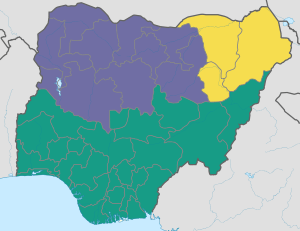Sharia in Nigeria

In Nigeria, Sharia has been instituted as a main body of civil and criminal law in 9 Muslim-majority and in some parts of 3 Muslim-plurality states since 1999, when then-Zamfara State governor Ahmad Sani Yerima[1] began the push for the institution of Sharia at the state level of government.
States
Twelve out of Nigeria's thirty-six states have Sunni Islam as the dominant religion. In 1999, those states chose to have Sharia courts as well as Customary courts.[2]
As of 2012, the following 9 states have instituted Sharia:
- Zamfara State (January 27, 2000)
- Kano State (June 21, 2000)
- Sokoto State
- Katsina State
- Bauchi State (June 2001)
- Borno State
- Jigawa State
- Kebbi State
- Yobe State
the following 3 states have also instituted sharia in some parts with large Muslim populations
- Kaduna State
- Niger State (May 4, 2000)
- Gombe State
Controversy
Some argue that as implemented in the north, Sharia violates the Constitution of Nigeria.[3]
Riots
There have been numerous riots over the implementation of sharia law, primarily involving non-Muslim minorities in the states which implemented the system. One such riot killed over 100 people in October 2001 in Kano State.[4][5]
Amina Lawal
In 2002, negative light was brought to sharia in northern Nigeria when Amina Lawal, a single mother in Katsina State, was accused of adultery and sentenced to death by stoning by a state Sharia court for conceiving a child out of wedlock; the father was released without conviction for lack of evidence. Lawal's conviction provoked outrage both in southern Nigeria and the West, with many national and international NGOs lobbying the federal government to overturn her conviction. In 2004, the conviction was overturned by the Sharia court of appeal, and Lawal returned to private life.[6]
Safiya Hussaini
Blasphemy and apostasy
A Sharia court may treat blasphemy as deserving of several punishments up to, and including, execution.[7][8] In many predominantly Muslim states, conversion from Islam to another religion is illegal and often a capital offence.[9]
In 2014 a Nigerian man, Mubarak Bala was forcibly committed to a psychiatric institution in Kano for eighteen days, where he was forcibly drugged after stating that he was an atheist. The International Humanist and Ethical Union took up the case, stating that Bala's human rights were violated.[10]
Executions
In 2002, the first execution of a man under Sharia took place in Katsina State; Human Rights Watch condemned the execution.[11]
Sharia Court of Appeals
Recognized as a federal court of appeals under the government of Nigeria, the Sharia Court of Appeals is the most controversial of the judicial system. It exists within the Federal Capital Territory of Nigeria and is a part of the Unified Courts System. The Sharia Court of Appeals reviews cases involving Sharia law, particularly in the North and Northeast regions of the country. This has caused controversy because while the Sharia Court of Appeals interprets and reviews cases relating to Islamic law, they must also interpret the common and customary laws of the other regions of Nigeria.[12]
See also
- Islam in Nigeria
- Religion in Nigeria
- Blasphemy law in Nigeria
- Polygamy in Nigeria
- New radical Islamic movements in Nigeria
References
- ↑ Nigeria Sharia architect defends law, BBC News, 21 March 2002
- ↑ "Nigeria: International Religious Freedom Report 2008". U.S. Department of State. 2008. Retrieved 2 August 2009.
- ↑ In Nigeria, Many Girls Are Married And Divorced Before Adulthood. June 29, 2014 7:58 AM ET.
- ↑ Obasanjo Assesses Riot Damage in Kano - 2001-10-16. Voice of America News.
- ↑ "Kano: Nigeria's ancient city-state". BBC online. BBC. 2004-05-20. Retrieved 2007-07-12.
- ↑ Koinange, Jeff. "Woman sentenced to stoning freed". CNN. Retrieved 30 September 2014.
- ↑ Amnesty International. Report on Saudi Arabia 2007. Archived from the original. Archived March 22, 2011, at the Wayback Machine.
- ↑ Amnesty International. Amnesty International Report on Saudi Arabia 2009. Archived from the original. Archived January 15, 2010, at the Wayback Machine.
- ↑ Nigeria: Recent reports regarding the treatment of persons who convert from Islam to Christianity. Recent reports on Sharia law in relation to religious conversion, Ireland: Refugee Documentation Centre, 26 June 2012, Q15539; available at: http://www.refworld.org/docid/50068bbf2.html [accessed 18 July 2014].
- ↑ Nigeria atheist Bala 'deemed mentally ill in Kano state'
- ↑ Nigeria: First Execution under Sharia Condemned, Human Rights Watch, January 8, 2002
- ↑ http://www.nyulawglobal.org/globalex/Nigeria.htm